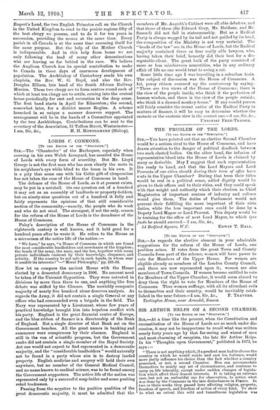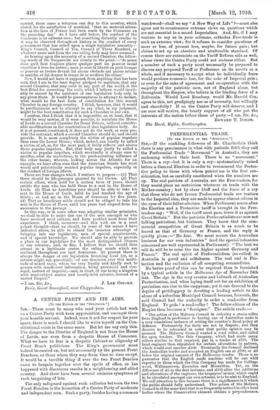SIR ARTHUR HELPS ON A SECOND CHAMBER.
[To THE EDITOR OF THE "SPECTATOR."] SIE,-At a time like the present, when the Constitution and reconstitution of the House of Lords are so much under dis- cussion, it may not be inopportune to recall what was written nearly forty years ago by that far-seeing and wisest of men and most charming of essayists, the late Sir Arthur Helps. In his "Thoughts upon Government," published in 1872, he
Says :-
"There is not anything which, if a prudent man had to choose the country in which he would reside and cast his fortunes, would more justly influence his choice than the fact whether a country possessed, or not, a second Chamber. Men can accommodate themselves to nearly any set of circumstances, and continue to carry on life tolerably, except under sudden changes of legisla- tion which affect their dearest interests. It is taking an extrema case, but not an unfruitful one for observation, to notice what was done by the Commune in the late disturbances in France. In two or three weeks they passed laws affecting religion, property, freedom of speech, and freedom of action of every kind. To show to what an extent this wild and tumultuous legislation was carried, there came a telegram one day to this country, which stated, for the satisfaction of mankind, ' that no material altera- tion in the laws of France had been made by the Commune on the preceding day.' As I have said before, the conduct of the Commune is an extreme case ; but something distantly similar to it may be observed throughout history in the conduct of every government that has relied upon a single legislative assembly— King's Council, Council of Ten, Council of Three Hundred, or whatever name and form the one ruling body may have assumed. As bearing upon the necessity of a second Chamber, the follow- ing words of De Tocqueville are closely to the point :—'Je pease done qu'il faut toujours placer quelque part un pouvoir social superieur it tons les autres ; reels je crois In liberte en peril lorsque ce pouvoir ne trouve devant lui aucun obstacle qui puisse retenir sa marche, et lui Bonner le temps de se moderer lui-meme.' Now, I would not have it supposed, from anything that has been said, that I am in the least degree pledged to maintain, that any second Chamber, that may exist in any part of the world, is the best fitted for correcting the evils, which I believe would inevit- ably be caused by the existence of one legislative body only, in any given State. It would be presumptuous to attempt to declare, what would be the best form of constitution for this second Chamber in any foreign country. I think, however, that it would be pusillanimous not to attempt to say what, in my judgment, might be the best constitution for such a Chamber in our own.
I confess, that I think that it is impossible, or, at least, that it would be very unwise, if it were possible, to maintain the House of Lords as a second Chamber for Great Britain, without consider- able modifications in the constitution of that legislative body. As it is at present constituted, it does not do the work, or even pro- vide the restraint, which a second Chamber should do, and should provide. It is more completely the victim of popular impulses than even the Lower House; which, indeed, can hardly be called a victim at all, as, for the most part, it fairly reflects and shares those popular impulses. But, that body may justly be called a victim to popular impulses, which eventually is always sure to sacrifice, even its convictions, to the predominating influence of the other house ; whereas, looking across the Atlantic for an example, we have often seen that the American Senate has most wisely and patriotically resisted popular impulses, especially in the conduct of foreign affairs.
There are four changes which I venture to propose :—(l) That there should be life-peerages granted by the Crown. (2) That certain offices, when held for a certain term of years, should entitle the man who has held them to a seat in the House of Lords. (3) That no hereditary peer should be able to take his seat in the House of Lords, until he had reached the age of thirty ; or had sat in the House of Commons for five years. (4) That an hereditary noble should not be obliged to take his seat in the House of Peers, until ten years had elapsed from his succession to the peerage In this way, or in some other way, adopting similar principles, we shall be able to make due use of the men amongst us who have received most culture, and have profited most from their experience. I think, moreover—and this with me is a most potent thought—that we should, by some of the means I have indicated above, be able to obtain the immense advantage of bringing into our legislature, men of special acquirements, and of special knowledge. We should also be able. to provide a place in our legislature for the most distinguished citizens in our colonies ; and, in fine, I believe that we should thus attract to a legitimate centre the ruling minds which are scattered throughout our vast dominions. At present there is always the danger of our legislation becoming local (or, as a satirist might say, parochial),—of our dominion over this multi- tude of mixed races, whom we very loyally and kindly seek to govern with insufficient information, being provincial and vice- regal, instead of imperial,—and, in short, of our being a kingdom with semi-subject realms and loosely-held colonies, instead of a united Empire."
Bevis, Great Somerford, near Chipper.ham.















































 Previous page
Previous page